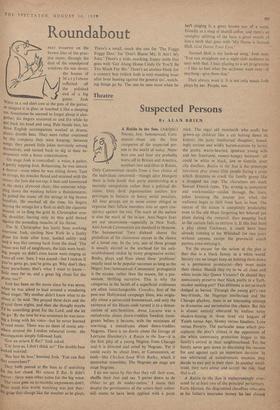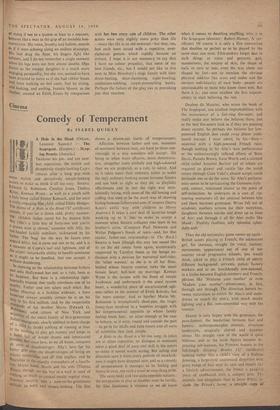Theatre
Suspected Persons
By ALAN BRIEN
A Raisin in the Sun. (Adelphi.) NEGRO, Jew, homosexual, Com- munist—these are the four categories of the suspected per- son in the world of today. Num- bers one and four are probably worst off in Britain and America, numbers two and three in Russia. Only Communism results from a free choice of the individual concerned—though after Hungary there is little doubt that party membership is a neurotic compulsion rather than a political de- cision. Only dark pigmentation confers few privileges to balance its heavy social penalties. All four groups are to some extent obliged to organise their fellow members into an open con- spiracy against the rest. The mark of the outlaw is also the mark of the in-law. Anti-Negro Jews are not uncommon—especially in New York. Anti-Jewish Communists are standard in Moscow. The homosexual Tory diehard shares the prejudices of his classmates except in the choice of a loved one. In the arts, one of these groups is usually elected as the warhead for his anti- establishment rocket by every progressive writer. Books, plays and films about these `problems' usually tend to be popular successes as long as the Negro/Jew / homosexual / Communist protagonist is the excuse, rather than the reason, for a pas- sionate, thrilling narrative. This is why the categories in the hands of a superficial craftsman are often interchangeable. Crossfire, first of the post-war Hollywood campaign films, was origin- ally about a persecuted homosexual, and only the existence of the Hayes code turned it to a denun- ciation of anti-Semitism. Anna Lucasta was a melodrama about. down-trodden Swedish immi- grants before it became, with the minimum of rewriting, a melodrama about down-trodden Negroes. There is no doubt about the lineage of Lorraine Hansbury's A Raisin in the Sun—it is the first play of a young Negress from Chicago and it is directed and acted by Negroes. Yet it could easily be about Jews, or Communists, or both—like Chicken Soup With Barley, which it somewhat resembles. The Negroes on stage are stage Negroes.
I do not mean by this that they roll their eyes, shuffle their feet and say 'I gwine down to de ribber to get de wodey-melon.' I mean that despite the genuineness of the actors their colour still seems to have been applied with a paint stick. The regal old matriarch who scuffs her grown-up children like a cat batting down its kittens; the jazzy intellectual daughter, brood- ingly serious and wildly harum-scarum by turns; the pretty, warm-hearted, ignorant young wife and her frustrated, money-hungry husband : all could be white or black. Jew or Gentile, poor city dwellers. Raisin in the Sun is the prototype television play about little people facing a crisis which threatens to crack the family group like a dropped tea cup. The characters are stock Samuel French types. The writing is competent and workmanlike—smiles through the tears, jokes breaking the tension just when the audience begin to shift from ham to ham. The course of the action is completely predictable even to'the old Mum forgetting her beloved pot plant during the removal, then popping back as the curtain falls to retrieve it. If this had been a play about Cockneys, it could have been already running at the Whitehall for two years without anyone, except the provincial coach parties, even noticing it.
Yet the excuse for the action of the plot is that this is a black family in a white world. Society can no longer keep on holding them down as a permanent proletariat—they must make their choice. Should they try to he all clean and white inside like Queen Victoria? Or should they consciously preserve their black purity in a Tech- nicolor melting-pot? This dilemma is not so much dodged as buried. Through the young girl's two boy-friends, the Nigerian intellectual and the Chicago playboy, there is an interesting attempt to dramatise and personalise this choice. But this is almost entirely obscured by endless noisy shadow-boxing in those tired old leagues of Youth versus Age, Money versus Idealism. Love versus Poverty. The particular issue which pre- cipitates the play's climax is the opposition of the white community protection league to the family's arrival in their neighbourhood. Yet the family never gets down to discussing the reasons for and against such an important decision. In one whirlwind of melodramatic emotion they decide to stay put in their slum. In another whirl- wind, they turn about and accept the risk. And that is all.
A Raisin in the Sun is embarrassingly over- acted by at least two of the principal performers. Earle Hyman, the disgruntled chauffeur who sees in his father's insurance money his last chance of rising if not to a tycoon at least to a toycoon, behaves like a man in the grip of an invisible boa- constrictor. His voice, breathy and hollow, sounds as if it were echoing along an endless drainpipe. His feet drag the floor, his fingers fight like lobsters, and I do not remember a single moment When his legs were not bent almost double. Olga James as the snappy daughter is a much more engaging personality, but she, too, seemed to have been directed to move as if she had rubber bones and were walking on hot coals. Just by sitting, and looking, and smiling, Juanita Moore, as the Mother, seemed an Edith Evans by comparison
with her two crazy cats of children. The other actors were only slightly more jerky than life —more like life in an old newsreel—but they, too, had each been issued with a repetitive, over- elaborate gesture which rapidly became an irritant. I hope it is not necessary to say that I have no colour prejudice, that some of my best friends, etc., but I would not like to live next to Miss Hansbury's stage family with their drum-beating, door-slamming, night-howling, confession-sobbing, carpet-pummelling habits. Perhaps the failure of the play lies in provoking just that reaction.



































 Previous page
Previous page